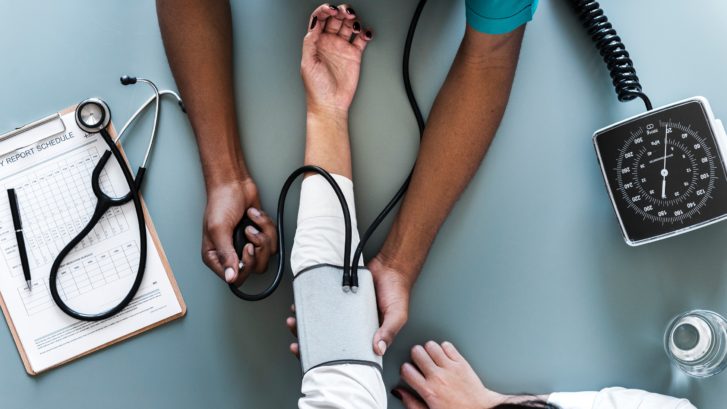10 Natural Ways to Lower Blood Pressure
High blood pressure (hypertension) can be deadly. In addition to spawning myriad health problems including heart attacks and strokes, other illnesses associated with hypertension can include kidney disease, blindness, and dementia. Unfortunately, it rarely produces detectable symptoms in sufferers until it has done serious damage.
That’s why our concierge doctors in Jupiter check it every time we see you. Keeping your blood pressure within the normal range (currently considered to be 120/80 or below) is the single most effective measure you can take to maintain your cardiovascular health.
If it’s above normal, we will recommend you take steps to lower it, such as adhering to the DASH diet (fresh vegetables, lean protein, whole grains, low salt, and low-fat dairy), losing weight, stopping smoking, exercising regularly, and reducing stress. If those non-medical approaches don’t achieve the desired results, we will prescribe medication.
But there are other, less conventional methods you may not know about to help keep those figures within acceptable levels.
-
Isometric handgrip exercises
An American Heart Association study found that squeezing a spring-loaded hand grip for two minutes, over a period of 12 to 15 minutes three times a week, can help lower blood pressure. Why? Researchers found that blood flow returns to your hands after the isometric exercise, improving blood vessel function. Another study reported in the journal Hypertension found this exercise produced a 10 percent drop in both systolic (top number) and diastolic (bottom number) readings when practiced six times a day, five days a week for four weeks.
-
Reducing sugar intake
Sugar can raise blood pressure even more than salt, as numerous studies have confirmed since 2014. That’s because sugar makes blood vessels contract more strongly than normal, resulting in a rise in blood pressure.
-
Increasing potassium-rich foods
Potassium not only helps decrease the sodium in your blood, it also helps relax blood vessels. As you know, we prefer that you obtain vitamins and minerals through food, and it turns out that you can get enough potassium through the foods you eat to skip the supplements. Bananas are tops in this mineral; other good choices include leafy greens, avocados, oranges, apricots, tuna, and salmon.
-
Giving and getting hugs
Researchers have found that physical contact with another human being—or with even animals—releases the hormone oxytocin, which dampens stress and sympathetic nervous system activity in your cardiovascular system, thus lowering blood pressure.
-
Avoiding noise
A study at Lund University in Sweden found that daily exposure to noise above 64 decibels—equivalent to normal conversation or the sound of an electric shaver—raises your risk of high blood pressure 90 percent. If you can’t get away from noise (for example, if you live near a busy highway), try noise-canceling headphones or earplugs, when feasible.
-
Controlled breathing
Slow, deep breathing has been shown repeatedly to lower blood pressure by lowering stress hormones. Try to take 10 minutes daily to stop, relax your shoulder muscles, and breathe slowly. The correct breathing technique will cause your belly to expand, while your chest barely moves. Check this by placing one hand on your chest and the other on your abdomen until you learn to breathe this way naturally.
-
Getting (a little) sunshine
Researchers at the University of Edinburgh confirmed previous studies which found that subjects exposed to UV light experienced a significant drop in blood pressure, because the sun’s rays convert nitrate stored in your skin to nitric oxide, a compound that helps blood vessels retain their elasticity. Of course, you should never spend more than 10 minutes a day in the sun without sunscreen, because of the risk of skin cancer.
-
Watch your posture
Research has shown that slouching can affect the spinal nerves that help keep blood pressure under control. This simple bad habit can raise blood pressure as much as 16 percent. Try to imagine a string coming out of the top of your head that you can pull taut whenever you feel yourself begin to slouch.
-
Indulge a little
Dark chocolate and cocoa contain flavonoids, plant compounds that help blood vessels dilate, thus lowering blood pressure. Two ounces daily of high-quality dark (not milk) chocolate is enough to achieve the effect.
-
Drink up
Water, that is. Chronic dehydration forces blood vessels to constrict, raising blood pressure. In addition, your body will retain sodium in an attempt to conserve its water supply. Aim for eight to 10 eight-ounce glasses of water daily—more if you’re exercising or perspiring heavily.
If you are taking medication we’ve prescribed to lower blood pressure, never stop without checking with us first. If your blood pressure medication is causing unwanted side effects, please discuss them with us. We can adjust your prescription to alleviate them.

